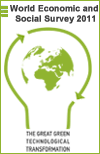 Hot off the wires: Hot Topic’s Durban correspondent Cindy Baxter posts her first insider’s view from COP 17.
Hot off the wires: Hot Topic’s Durban correspondent Cindy Baxter posts her first insider’s view from COP 17.
As thousands of people poured into Durban’s massive conference building yesterday morning for the start of the 17th session of climate talks, we heard news that the extraordinary storm we’d gotten soaked in on Sunday night had actually killed eight people in this very city.
It was a chilling start to the two-week talks and a stark reminder to us all as to what is at stake, just a week after the IPCC warned us that extreme weather events are going to get more frequent.
Also over the weekend weekend we saw the start of a story that is playing out in the corridors. It seems that the big developing country emitters: China, Brazil and India, have joined the US and others in saying there will be no new legally binding agreement on climate change until at least 2020.

 How better to journey to the
How better to journey to the  In a comment on Tom Bennion’s recent
In a comment on Tom Bennion’s recent  I’ve been looking at the
I’ve been looking at the